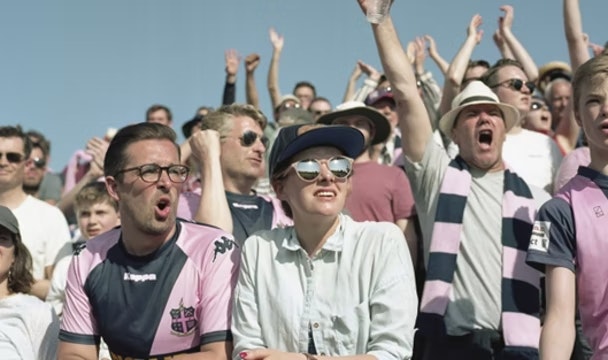The rise of the giant killers: football’s underdogs are building winning brands
Football is big business. But while the world’s biggest clubs are doing the same things to compete for the same fans, is the true brand innovation being achieved at the grassroots level of smaller community-focused teams? For The Drum’s Sports Marketing Deep Dive, Nick Horne, creative director of agency True, looks into the combined viral community successes of Venezia FC and Dulwich Hamlet to see what lessons they hold for other clubs and sports brands.

Are community-led football clubs taking the lead in a new kind of way? True investigates.
Over the last 20 years, most Premier League teams have focused on growing global revenue and expanding reach into new territories, expanding the Premier League’s share of the global market rather than growing their individual brands. Clubs have told and re-told a story of sporting prowess and success, so much so that they’ve almost become one: all simply ‘Big Premier League Clubs.’
The issue is that success is quite an empty promise, it’s potentially short-lived and it does not lift them above their peers. We know that gen Z in particular have moved their allegiances to stars rather than clubs; it’s easy to see how they can identify with multi-dimensional humans more than clubs whose only call-outs are on-the-field successes.
Research suggests youth interest in traditional spectator sports is waning, with just 53% of gen Z identifying as sports fans, compared with 69% of millennials.
Remembering the tribe
Over the last 30 years, British football has undergone a massive transformation, moving away from a heavily male-orientated environment with strong associations with hooliganism. Rightfully, clubs have sought to shift their audience. But, I would argue, the fear of violent male tribalism has led clubs to miss the fact that many sports (in particular football) are by nature tribalistic.
People want to be able to unite behind a tribe. In the mission to make football more inclusive, we’ve forgotten to identify what their ‘new tribe’ is. With that, club brands have lost their identities.
The audience hasn’t disappeared, but their needs are being unfulfilled by traditional clubs. It’s led to the emergence of organizations such as darwinfootball.club, a pseudo football club/campaign group focused on developing diversity, equality and respect by making football a space where different demographics feel welcome. It campaigns and sells merchandise based on what the new generation is looking for, collaborating with creators to change the look and expectation of what a football club can be.
Some smaller clubs, meanwhile, have grasped the opportunity to stand out, building communities and brands from the bottom up. This lays the foundations for growth.
Venezia FC, a second-tier Italian football club, has absolutely found its tribe. Affectionately dubbed “the most fashionable club in world football,” it re-focused its brand to appeal to a younger audience. With a passion for style and forward-thinking, it broke many of the stereotypes of football, picking a lane many would previously have seen as being diametrically opposed to the culture of football.
It severed ties with kit-maker Nike in favor of Kappa to give it greater control, moving away from strict rules around templated designs. It re-worked the website to place its women’s and men’s team on absolute equal hierarchy on the homepage (a move that, unfortunately, does stand out in world football), and turned its online store into something more reminiscent of a fashion magazine – a feeling replicated both in its boutique-like physical store and matchday experience.

It’s working. It is pulling in crowds, not just locally, but (ironically) from that global audience that the big clubs are chasing. It’s getting column inches worldwide; its kit can be seen on the backs of fans even here in my home city of Bristol, UK (I can’t remember the last time I saw someone wearing an AC Milan shirt); and, since March 2021, global searches for Venezia FC have increased by between 8x and 10x its previous average, and remain at that level.
Visiting the hamlet
Dulwich Hamlet is a semi-professional club from England’s sixth tier that has established itself as a genuine family and community destination, heavily organized and influenced by a supporters’ trust that has run a number of diversity and inclusion initiatives in the community. The matchday experience brings in music, street food and an atmosphere somewhere between that of a festival and a farmers’ market.
In an ironic twist on old-school football chants, Dulwich’s “we stole your pattie van” references the fact that the Jamaican pattie van vendor moved from local rivals Tooting to be a part of the Dulwich matchday revolution.
Kids are growing up as part of the club and new followers are coming in droves. By building a long-term fanbase, attendances grow year-on-year.
Venezia and Dulwich are very different beasts to Premier League sides. But if you try to be all things to all people, you’ll end up nothing to anyone. To feed major clubs’ financial machines, global revenues are necessary, but there are ways to grow globally while developing a lasting legacy that endures.
As new money flows into the game and greater financial competition and success from new-money clubs such as Newcastle arrive, it’s ever-more imperative that clubs find a voice, and a tribe, that lasts.
Check out The Drum’s latest Deep Dive, The New Sports Marketing Playbook, and learn the tactics employed by the world’s biggest sports organizations and their star athletes to stay at the top of their game.
Content by The Drum Network member:

true
19 years ago true was founded with the aim of being different; straight-talking, to the point, focussed on delivering long-term growth, not through chat, but through...
Find out more
